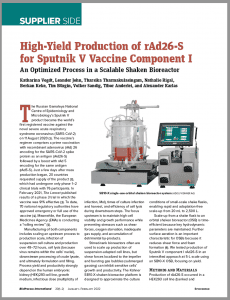Voices of Biotech
Podcast: MilliporeSigma says education vital to creating unbreakable chain for sustainability
MilliporeSigma discusses the importance of people, education, and the benefits of embracing discomfort to bolster sustainability efforts.
Sponsored by Adolf Kühner AG
 The recent outbreak of the severe acute respiratory syndrome coronavirus (SARS-CoV-2) led to the development of different vaccine approaches worldwide to prevent the coronavirus disease 2019. The first registered vaccine on the market was the Sputnik V product based on two recombinant adenoviral vectors (Ad5 and Ad26). The product has received approval in 70 countries by several national and regional regulatory authorities, meanwhile. Though the availability of SARS-CoV-2 vaccines in most developed countries is not an issue any longer, other countries are still highly underserved regarding the access to functional vaccines against the coronavirus disease. Therefore, an optimized production process to achieve the maximal yield of this adenovirus-based vector system is urgently needed to reduce costs per dose and make this vaccine affordable to everyone. Here we describe the development of a highly efficient upstream process to produce adenoviral vectors expressing the spike protein of SARS-CoV2 at high titers. Remarkably, we could demonstrate that the propagation of adenoviruses works very efficiently by cultivating HEK293 cells, the cell line for rAd26-S and rAd5-S production, in perfusion mode at high cell density using the Kuhner orbital shaken bioreactor SB10-X. We demonstrated that scale-up using the orbital shaken bioreactor system simplifies the transfer of shear-sensitive cells from laboratory-scale shake flasks to pilot scale, which in turn could be transferred to production scale. Our data revealed that such an optimized bioreactor process yields more than 100 doses of rAd26-S per milliliter of culture medium. Thus, the identified parameters might help to increase the efficacy to produce adenoviral-based vaccines and ultimately allow vaccination of people in the whole world.
The recent outbreak of the severe acute respiratory syndrome coronavirus (SARS-CoV-2) led to the development of different vaccine approaches worldwide to prevent the coronavirus disease 2019. The first registered vaccine on the market was the Sputnik V product based on two recombinant adenoviral vectors (Ad5 and Ad26). The product has received approval in 70 countries by several national and regional regulatory authorities, meanwhile. Though the availability of SARS-CoV-2 vaccines in most developed countries is not an issue any longer, other countries are still highly underserved regarding the access to functional vaccines against the coronavirus disease. Therefore, an optimized production process to achieve the maximal yield of this adenovirus-based vector system is urgently needed to reduce costs per dose and make this vaccine affordable to everyone. Here we describe the development of a highly efficient upstream process to produce adenoviral vectors expressing the spike protein of SARS-CoV2 at high titers. Remarkably, we could demonstrate that the propagation of adenoviruses works very efficiently by cultivating HEK293 cells, the cell line for rAd26-S and rAd5-S production, in perfusion mode at high cell density using the Kuhner orbital shaken bioreactor SB10-X. We demonstrated that scale-up using the orbital shaken bioreactor system simplifies the transfer of shear-sensitive cells from laboratory-scale shake flasks to pilot scale, which in turn could be transferred to production scale. Our data revealed that such an optimized bioreactor process yields more than 100 doses of rAd26-S per milliliter of culture medium. Thus, the identified parameters might help to increase the efficacy to produce adenoviral-based vaccines and ultimately allow vaccination of people in the whole world.
Just fill out the form below to read the full article.
You May Also Like